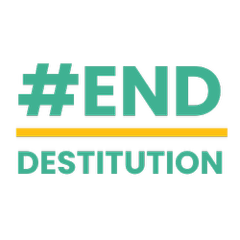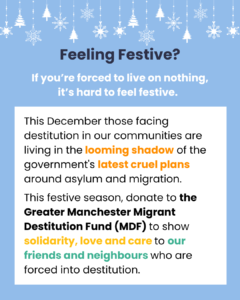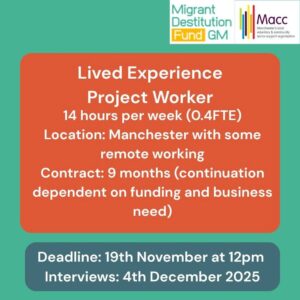our stories
Kamrul's story
 I have been in the UK since 2010, it took five years eight months to be granted as a refugee, I was refused six times before it was finally accepted. During this time I had no recourse to public funds four different times, each time for 2-4 months.
I have been in the UK since 2010, it took five years eight months to be granted as a refugee, I was refused six times before it was finally accepted. During this time I had no recourse to public funds four different times, each time for 2-4 months.
During one of these times in 2016 I was evicted from my asylum accommodation. I was homeless for a month – living on the street, not knowing any friends who could share a place to sleep. I had no money, food or knowledge about support. Fortunately the weather was not so chilly.
"The Fund helped me during the worst time, giving me space to submit a new asylum application."
I was in desperate need of food, shelter, and credit to talk to my lawyer and charities providing support. I had to walk everywhere to find any update. It gives me goosebumps thinking about that time.
The Fund helped me during the worst time, giving me space to submit a new asylum application. On the sixth time, it was accepted. Now I can work and get housing. I’m giving my time back to the Fund to help others have the same opportunity.
Tenneh's story
 Tenneh is originally from West Africa. She came to the UK in 2015 with her two daughters, “I suffered for domestic violence and they want to do FGM, female genital mutilation, to my girls. So that is why I came to England”. Fearing for her own safety and the safety of her children, Tenneh sought asylum in the UK but was refused as they said her story was inconsistent, “You know I have mental health issues, my state of mind wasn’t good and the person interviewing me was just forcing on me and I don’t know what I’m doing. Since then it has been a rough, tough situation”.
Tenneh is originally from West Africa. She came to the UK in 2015 with her two daughters, “I suffered for domestic violence and they want to do FGM, female genital mutilation, to my girls. So that is why I came to England”. Fearing for her own safety and the safety of her children, Tenneh sought asylum in the UK but was refused as they said her story was inconsistent, “You know I have mental health issues, my state of mind wasn’t good and the person interviewing me was just forcing on me and I don’t know what I’m doing. Since then it has been a rough, tough situation”.
Unfortunately this is a common experience for asylum seekers, in their report, Waiting in the Dark: How the Asylum System Dehumanises, Disempowers, and Damages Refugee Action found that poor practice during interviews often led to distress and anxiety and in the worst cases was a key factor in an incorrect decision.
Tenneh has made three applications for asylum all of which have been refused. Tenneh is unable to work and her immigration status now has the ‘no recourse to public funds’ policy attached to it meaning she is limited in the benefits and housing support she can access. Having such little access to funds makes it very difficult to reapply for asylum as it is a very costly process. This leaves Tenneh in limbo and her family disadvantaged and living in sub-standard conditions, "we were eventually given accommodation, but the accommodation is so bad, the bath is dripping through the floor...we are washing our clothes by hand with cold water...the heating is not working, we are freezing".
"There are people in this country suffering because you cannot work, you have no recourse to public funds"
Her immigration status also affects her children, and not just in terms of accessing daily essentials. Her eldest daughter has studied hard at school in England and got the grades to be accepted in to university, "she is so brilliant, all her grades in college are distinction", but she would have to pay international fees which they cannot afford so she will leave school unable to study further and unable to work or claim benefits.
Pausing the Fund has impacted Tenneh significantly, “we are begging that it should continue because there are people in this country suffering because you cannot work, you have no recourse to public funds, if you go to the council they check your details, they know that they can’t give you anything, so this money, it really saves lives”.
Returning to West Africa is not an option for Tenneh, “I can’t go back, I can’t ... Back home I fled from domestic violence and they want to perform FGM on my girls, if we go back we will face what we are running from, we cannot go back. My children they love it here, they are fine, this is where they call home now”.
Despite the hardships she has experienced since arriving in the UK, Tenneh has nothing but positive things to say about the people and the community she is part of here, “Manchester is a welcoming place for everybody, there’s a lot of opportunity, the community are friendly. We love Manchester. It is a quiet place as well, not too rowdy, they don’t fight, they love migrants, and there is a lot of diversity. We like it in Manchester, it’s a welcoming place”.
Elizabeth's story
 Elizabeth was born in West Africa, and had a formidable career in her home country, rising to Deputy Director of nursing. She studied in the UK and when her husband died she came back here to work as a nurse and paid taxes here. She cared for British citizens when they were sick. But although she gave both financially and in care to the UK, her immigration status had the no recourse to public funds (NRPF) policy attached to it. This meant she couldn’t access the majority of state welfare or housing support and when she retired due to chronic arthritis she had no safety net to fall back on, and no pension to support her, “I can’t walk, I can’t sit, I can’t stand – the arthritis is all over, it is complete, my body hurt everywhere. So I can’t work”.
Elizabeth was born in West Africa, and had a formidable career in her home country, rising to Deputy Director of nursing. She studied in the UK and when her husband died she came back here to work as a nurse and paid taxes here. She cared for British citizens when they were sick. But although she gave both financially and in care to the UK, her immigration status had the no recourse to public funds (NRPF) policy attached to it. This meant she couldn’t access the majority of state welfare or housing support and when she retired due to chronic arthritis she had no safety net to fall back on, and no pension to support her, “I can’t walk, I can’t sit, I can’t stand – the arthritis is all over, it is complete, my body hurt everywhere. So I can’t work”.
At 77 years of age Elizabeth lives in Manchester and is destitute, “In my bank there’s no penny in it. That is how I live, no money. How, I say to myself, how is it that this lady, Deputy Director, is suffering beyond expression? Sometimes I am too miserable to eat. I can’t eat. Sometimes I eat twice a day, sometimes once a day, sometimes I don’t eat at all”.
Last month Elizabeth was taken to court for council tax arrears, “They told me to pay £20 every month. And this £20, I don’t know where to get it. This £80 that you give me, I need this so I will be paying it. It makes me miserable, depressive … I can’t die for nothing, I can’t just take my life because of council tax”.
“In my bank there’s no penny in it. That is how I live, no money. How, I say to myself, how is it that this lady, Deputy Director, is suffering beyond expression?"
When Elizabeth arrived in the UK her bag was stolen with her passport in, the passport was replaced and she took it to the home office to get her papers, “Still the passport is there today. I have no papers”. This was nearly 20 years ago. “It’s too long, too long. If I’m able to get papers then I am able to get carers. Carers will be able to come to the house and do all these things – I can’t stand or even cook a boiled egg”.
The Migrant Destitution Fund has currently had to suspend its grants due to a lack of funding. When asked how she will cope without the monthly £80 Elizabeth replied, “I will go and borrow. I borrow from the church, maybe I will ask one of the people for money, that’s how I do. But sometimes I can’t borrow because I’m ashamed, ashamed of myself”.
Elizabeth has been forced to survive on the kindness of others that she has been lucky to find in Manchester. She is supported by the local charity, Equal Education Chances who amongst other things even help her to clean her house. Her church helps her financially at times, and a friend living nearby comes to help shop and cook food for her.
Elizabeth is a strong and resilient woman, she cared for people when they were sick, and she paid taxes here – she contributed significantly to this country. Yet the NRPF policy, part of the government’s hostile environment towards immigration, has left her destitute when she is unwell and needs care herself. This isn’t right.




